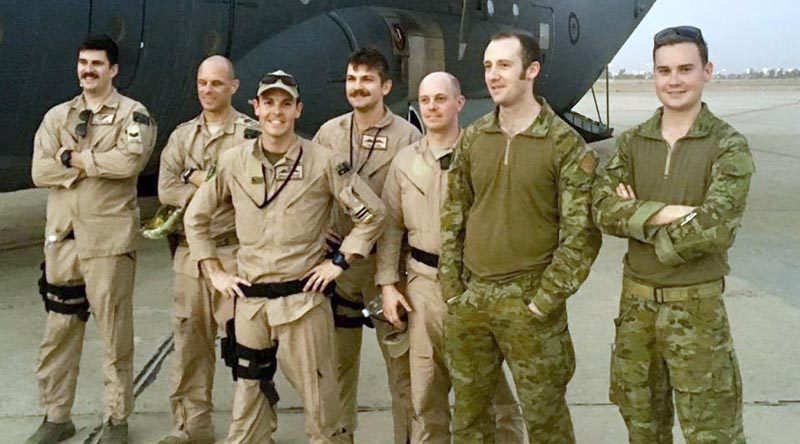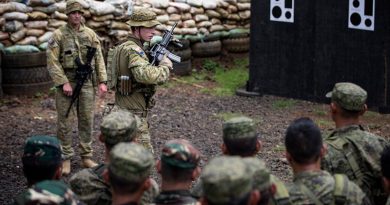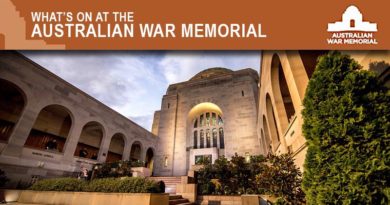Pilot honoured two years after Hercules near disaster
Share the post "Pilot honoured two years after Hercules near disaster"

The safe resolution of an in-flight emergency over Iraq has led Flight Lieutenant Brendon Carraro to be recognised in the 2020 Australia Day Honours list.
CAPTION: The crew of Mambo 21 stand in front of a Royal Australian Air Force C-130J Hercules at Baghdad International Airport. Flight Lieutenant Brendan Carraro, the aircraft captain, is pictured third from the left (wearing a cap). Photographer unknown. Story by Eamon Hamilton.
Flight Lieutenant Carraro was awarded the Commendation for Distinguished Service (CDS) for his actions as the captain of a Royal Australian Air Force (RAAF) C-130J Hercules transport aircraft during a mission in the Middle East Region on August 7, 2017.
The aircraft – callsign MAMBO 21 – was on a night-time mission in support of Operation OKRA when the crew experienced a massive failure of the aircraft’s electrical system and primary flight instruments.
The incident was the first failure of its kind for any C-130J Hercules in the worldwide fleet, however the crew were able to use back-up instruments to safely land with their 29 passengers at Baghdad International Airport.
In being awarded the CDS for his actions, the citation for Flight Lieutenant Carraro’s stated that he demonstrated superior piloting skill, airmanship, and leadership in “a safe and successful night landing of his seriously degraded aircraft”.
The citation also read that “His conduct of a safe night landing at an Iraq airfield saved his aircraft, his crew and the 29 passengers on board”.
But Flight Lieutenant Carraro said he was under no illusions that the safe landing in Baghdad was anything but a team effort.
“Without my co-pilot and loadmasters feeding me the right information at the right time, we would not have had such a favourable outcome,” Flight Lieutenant Carraro said.
“The crew’s actions were critical to achieving a safe landing and are commendable.”
“The actions of our two aircraft maintainers and two airfield defence guards on board were equally notable following the evacuation of the aircraft on the ground.”
Flight Lieutenant Carraro is currently posted to RAAF Base East Sale in Victoria.
Originally from Newcastle, he worked with BAE Systems Australia at RAAF Base Williamtown prior to joining the Air Force in March 2011.
“I was working as an Avionics Aircraft Maintenance Engineer, maintaining Air Force fast jets when I decided that I’d rather fly them than fix them,” Flight Lieutenant Carraro said.
After completing Officer Training School at RAAF Base East Sale, Flight Lieutenant Carraro graduated the RAAF’s Advanced Pilot Training Course in March 2013.
Flight Lieutenant Carraro was then posted to No. 37 Squadron at RAAF Base Richmond in Sydney’s northwest to learn to fly the C-130J Hercules transport aircraft.
Introduced to RAAF service in 1999, the C-130J Hercules can carry more than 100 passengers or up to 20 tonnes of cargo.
The Hercules can operate everywhere from small semi-prepared airfields to major international airports, making it an important logistics link for Defence.
That includes conducting missions in the Middle East Region, where deployed Hercules crews have carried Australian Defence Force and Coalition personnel continuously since February 2003.
On August 7, 2017, Flight Lieutenant Carraro was on his third deployment to the Middle East Region when he captained MAMBO 21, carrying 29 passengers and cargo in Iraq.
The crew consisted of two pilots – including Flight Lieutenant Carraro – along with three loadmasters, a pair of aircraft technicians, and two airfield defence guards.
In the cockpit, a bank of screens displays essential information from the aircraft – everything from engine data to navigation information, and detected faults.
The first indication of a problem on MAMBO 21 was when numerous faults were reported by the aircraft instantaneously, many of them conflicting in nature.
“While addressing those faults and assessing whether to proceed with the mission, the cockpit lit up like a Christmas tree,” Flight Lieutenant Carraro said.
“The number of faults increased exponentially beyond the aircraft computer’s ability to report them, and electronic information being presented to the crew appeared unreliable.”
The primary flight displays used by the pilots to fly the Hercules – including their heads up and heads down displays that show speed, altitude, and flight data – ceased to function.
The fault also affected engine instrumentation, radio control panels, and the status of critical aircraft systems like landing gear, brakes, and hydraulic systems.
Navigation displays were also inoperable as the crew of MAMBO 21 flew in night-time skies over Iraq.
The extent of failures encountered by the crew were so unprecedented that no checklist or response existed for their situation.
Flight Lieutenant Carraro immediately directed the aircraft to be configured for landing, with flaps extended and landing gear lowered, and the crew declared a Mayday call on the radio.
Their best option was to divert to the nearest suitable airfield, Baghdad International Airport, approximately 50 kilometres away.
“We were fortunate that we were actually very close to an airfield and we then conducted a number of height-loss orbits in order to achieve a suitable glide path for landing.” Flight Lieutenant Carraro said.
“It took just under 15 minutes before we landed.”
Flight Lieutenant Carraro said the crew’s professionalism in response to these failures was exemplary.
“The co-pilot’s professionalism while communicating our requirements to Air Traffic Control, and providing me support throughout emergency was exemplary; it enabled me to focus on flying the aircraft,” Flight Lieutenant Carraro said.
“The three loadmasters on board were crucial to developing situational understanding as aircraft systems continued to degrade. They identified the hydraulic system failures that occurred on the aircraft, and provided considerations to the pilots for landing.”
“Flying the aircraft was achieved by feel and through the standby instruments. I navigated visually through my night-vision goggles while improvising some spatial awareness by utilising the GPS on my iPad.”
The crew managed a safe landing into Baghdad without any damage to the aircraft, and passengers were safely evacuated by the loadmasters and airfield defence guards.
Investigations into the faults revealed an unprecedented failure had occurred with the computers on MAMBO 21.
Two back-up computers on the aircraft reported contradictory information with the aircraft’s two primary mission computers, leading to a degradation across aircraft systems in the cockpit.
The failure had never before been experienced in more than 20 years and 1.3 million flight hours of C-130J operations by any operator.
The Hercules maintenance team that repaired MAMBO 21 was awarded with a Chief of Joint Operations Group Gold Commendation in November 2018 – the first time such a group award had been presented to Air Force.
In late 2017, Flight Lieutenant Carraro completed his tour with No. 37 Squadron on the C- 130J Hercules, and was posted to RAAF Base East Sale in Victoria.
As of January 2020, he is posted to the Central Flying School at RAAF Base East Sale, and is awaiting a Flying Instructor Course.
Once he graduates from this course, he will join No. 1 Flying Training School at RAAF Base East Sale as a Qualified Flying Instructor.
The job will see Flight Lieutenant Carraro teaching the next generation of Air Force, Navy and Army pilots how to fly.
“Despite all of the training, nothing could have prepared anyone for the challenges we faced during this incident,” Flight Lieutenant Carraro said.
“I’ve learned that a thorough understanding of systems and rules will enable an individual to make the best risk based decisions to achieve a favourable outcome in time critical situations.”
“Making those calculated risk-assessed decisions is something that all leaders and pilots should be prepared to do.”
In October 2019, Flight Lieutenant Carraro was notified that he would be awarded the Commendation for Distinguished Service.
“I was both humbled and speechless when notified that I was being nominated,” he said.
“The ripples of this event are still evident for me today.”
“The support from my wife Teresa, my family, close friends, and the C-130J teams I’ve deployed with have been outstanding, and for that, I am extremely grateful.”
His wife, Flight Lieutenant Teresa Carraro, is a Logistics Officer in the Air Force, and said she was proud of her husband being awarded the Commendation for Distinguished Service.
“The award nomination was very unexpected, but it is representative of who he is and the remarkable pilot and leader that I have seen him become,” Flight Lieutenant Teresa Carraro said.
.
.
.
.
.
.

.
.
Share the post "Pilot honoured two years after Hercules near disaster"





